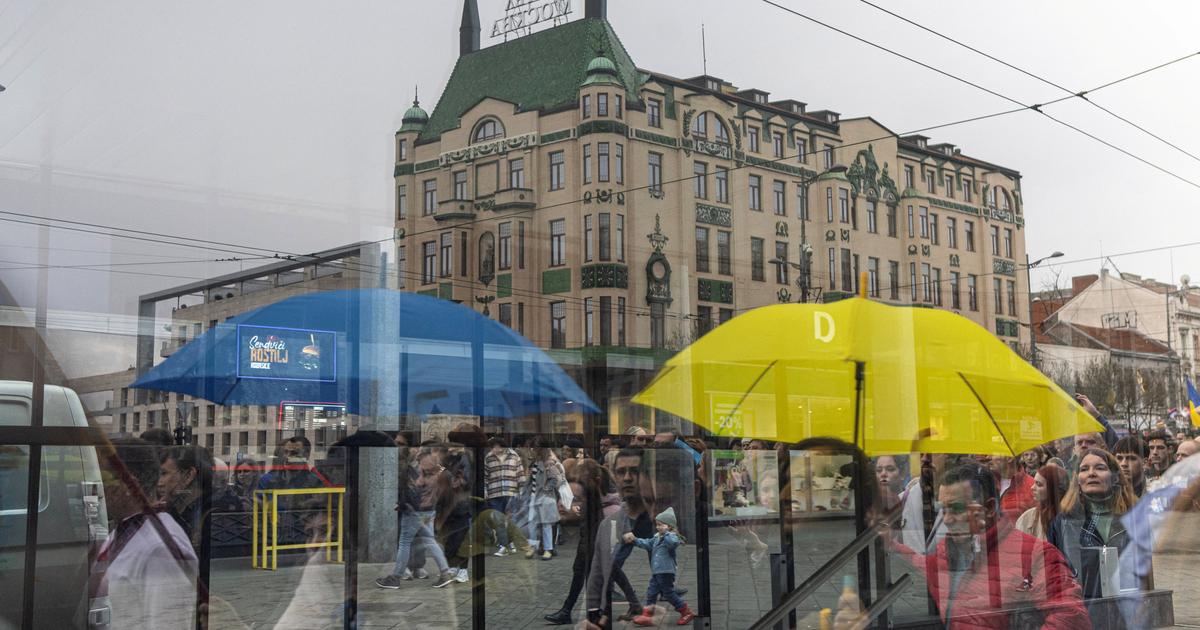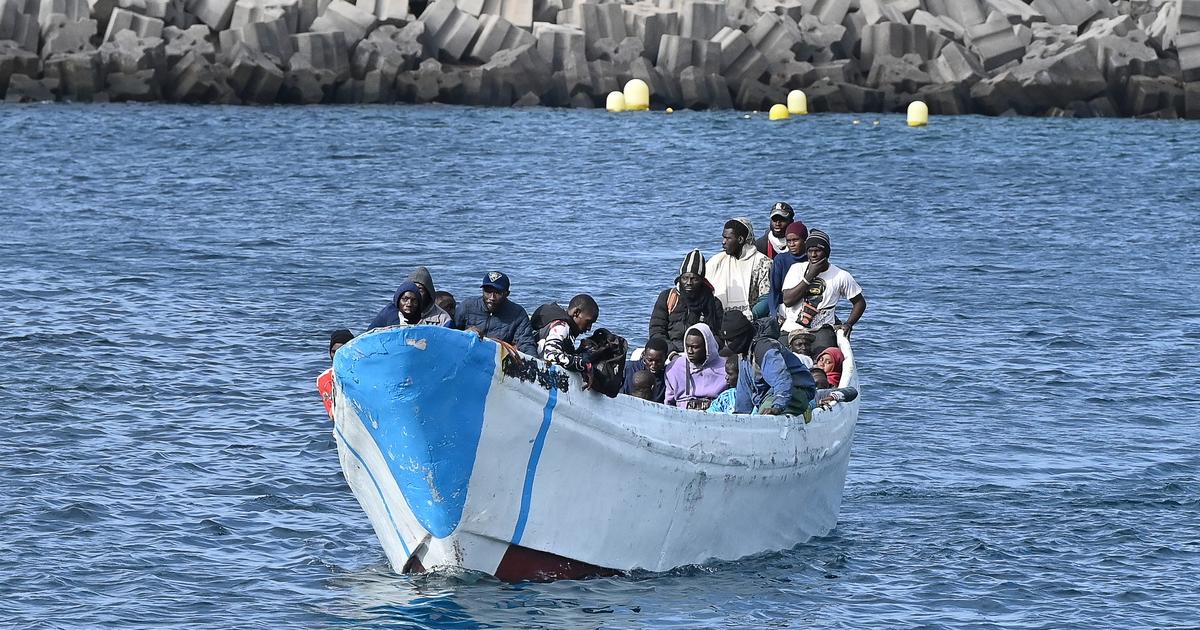Global society
all articles
The situation on Lesbos escalated on Sunday afternoon: Two fires broke out in the refugee camp on the Greek Aegean island, especially young migrants went to police officers. At least one woman died, 17 people were taken to the hospital injured.
For months, the number of people translating from Turkey to the Greek islands has increased. The Greek government is forced to bring more and more migrants to the mainland - to avoid disturbances as in the completely overcrowded camp on Lesbos as possible. The transfers are one of the reasons why now a route to the north of Europe is used again, which was considered closed: the Balkan route.
Thousands of migrants, who have remained in precarious conditions in Greek camps on the mainland, meanwhile try to get back from Greece to North Macedonia. From there you continue via Serbia, Hungary and Croatia to Austria or Germany.
According to SPIEGEL information, Frontex employees and Greek police now hold around 1,000 migrants a month. The authorities suspect that they will escape much more and successfully make their way north. That is much more than last year, according to the Greek police. The significant increase began in the spring and continues today.
Compared to the wedding in 2015, the number of refugees on the Balkan route is still low. At that time, hundreds of thousands of people used the land route to the EU, before the riparian states closed the borders. In 2018, the European border agency Frontex registered fewer than 6000 people across the Balkan route. If, as Greek policemen estimate, far more than 1000 people cross the Greek border each month, that's a significant increase in numbers.
Germany extends border controls
German border guards registered more than 6,700 illegal border crossings on the border between Austria and Germany in the first eight months of this year. Therefore, Minister of the Interior Horst Seehofer recently decided to extend the border controls and intensify the fog search at German borders.
Not only in the Greek Aegean Islands more refugees arrive. Even the Greek-Turkish border river Evros try to cross around 500 migrants a day, according to SPIEGEL information.
In Greece, refugees expect endless asylum procedures lasting up to three years. There are hardly any jobs for them, the conditions in the camps on the mainland are also bad. Many live in tents, winter is imminent.
Especially young men are therefore on the dangerous and long way on the Balkan route. Smugglers pay them 400 to 500 euros, from the northern Greek city of Thessaloniki it goes on freight trains towards the border, the smugglers give the migrants GPS coordinates on the way. The promise: In these places the border crossing should be unguarded, the crossing possible. Other smugglers are to receive the migrants in Serbia and point the way to Germany.
Byron Smith / Getty Images
Refugees in camp Camp Moria on Lesbos
Greek police is overwhelmed
Meanwhile, the Greek police do not manage to secure the roads across the border completely. Because the situation on the Greek Aegean Islands is so tense, many officials have been withdrawn from the border region. They are supposed to provide security on the islands and help with the transfers to the mainland. Only on Sunday did the Greek government send a plane with reinforcements to Lesbos.
The Greek government plans to send between 7,000 and 10,000 more asylum seekers to the mainland. They were classified as particularly vulnerable and therefore can not be returned to Turkey. This hardly happens anyway, so far less than 2,000 migrants have been returned to Turkey under the refugee deal between the EU and Turkey. In large parts, the deal never worked as planned, and Greece is now suffering as refugee numbers rise.
There is no short-term alternative to land disembarkations. All hotspots on the islands in the Aegean are overcrowded, the numbers continue to rise. Between 20 and 26 September, around 1500 refugees arrived on Lesbos alone. The olive grove, on the edge of the official camp, is therefore getting fuller. Once the camp was built for 3000 people, now more than 12,000 migrants live in inhumane conditions in Moria.
The government is therefore expanding its capacity on the mainland as best it can. She is looking for new places where camps can emerge. Old barracks should be used.
Greece is pushing for European aid
Meanwhile, the Greek asylum system is facing collapse: almost 70,000 cases have not been processed at all. The defense minister speaks of a "national crisis".
Kyriakos Mitsotakis, the new head of government, is seeking help from the EU. Because there is no common European migration policy for the foreseeable future, Greece would like to benefit in the meantime from the so-called coalition of the willing. In Malta, Germany, France, Italy and Malta had agreed to import and distribute migrants rescued from distress to safe European ports.
German Interior Minister Horst Seehofer travels to Turkey and Greece anyway this week. This will be followed by a meeting of European Home Affairs Ministers. Greece wants to address the topic there; Seehofer, it is to be heard, wants to offer German help to improve the situation in the camps.
More at SPIEGEL +
The Greek government has also decided to tighten its own asylum law. States such as Turkey should be declared a safe third country, where, for example, Afghans can be sent back. Afghans now make up the majority of refugees currently arriving. The procedures should be faster and more efficient.
The new Conservative Greek government also wants to tighten up the criteria according to which migrants are considered to be particularly vulnerable. Sooner or later, almost all migrants get this status, which allows them to get to the mainland.
The government hopes to increase the number of repatriations to Turkey to 10,000 by the end of 2020. The Federal Government would welcome that. Faster repatriations are part of the solution, said government spokesman Steffen Seibert on Monday in Berlin. However, even 10,000 repatriations would not lead to a noticeable improvement in the situation in the camps on the islands and on the mainland.
This article is part of the project Global Society, for which our reporters report from four continents. The project is long-term and supported by the Bill & Melinda Gates Foundation.
What is the project Global Society?
Under the title Global Society, reporters from Asia, Africa, Latin America and Europe will be reporting on injustices in a globalized world, socio-political challenges and sustainable development. The reportages, analyzes, photo galleries, videos and podcasts appear in the Politics Department of SPIEGEL. The project is long-term and will be supported over three years by the Bill & Melinda Gates Foundation (BMGF).
Are the journalistic contents independent of the foundation?
Yes. The editorial content is created without the influence of the Gates Foundation.
Do other media have similar projects?
Yes. Major European media such as "The Guardian" and "El País" have created similar sections on their news pages with "Global Development" or "Planeta Futuro" with the support of the Gates Foundation.
Was there already similar projects at SPIEGEL ONLINE?
SPIEGEL ONLINE has already implemented two projects in recent years with the European Journalism Center (EJC) and the support of the Bill & Melinda Gates Foundation: The "Expedition The Day After tomorrow" on Global Sustainability Goals and the journalistic refugee project "The New Arrivals" Several award-winning multimedia reports on the topics of migration and escape have emerged.
Where can I find all the publications on the Global Society?
The pieces can be found at SPIEGEL ONLINE on the topic page Global Society.







/cloudfront-eu-central-1.images.arcpublishing.com/prisa/WVK5IDQHBZHHXM2G2GQNBULNIM.JPG)